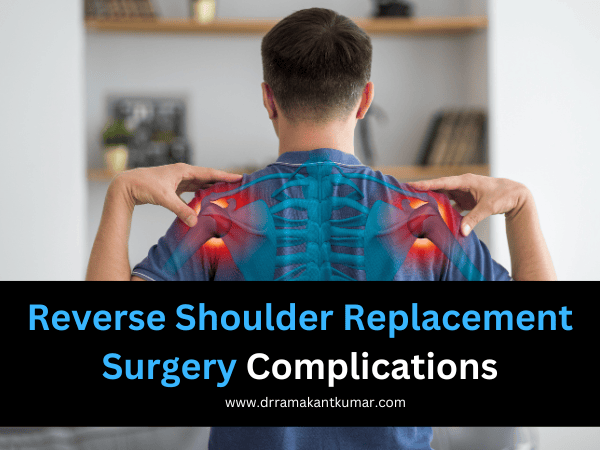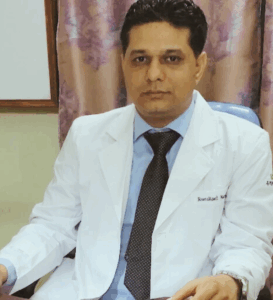Is Reverse Shoulder Replacement, A Major Surgery? Well, it’s a transformative medical procedure designed to address Reverse Shoulder Replacement Surgery Complications, offering renewed hope and functionality to individuals facing debilitating shoulder issues.
Unlike traditional shoulder replacements, the reverse shoulder replacement reverses the anatomical structure of the joint, placing the ball component on the shoulder blade and the socket component on the upper arm bone.
Is Shoulder Replacement Surgery Worth It? This innovative approach is particularly beneficial for patients with severe arthritis, irreparable rotator cuff tears, or failed previous shoulder surgeries.
During the surgery, skilled Orthopedic Surgeons In Patna meticulously remove damaged tissues, replacing them with prosthetic components that facilitate improved stability and range of motion.
This reversal of the shoulder’s natural mechanics compensates for the compromised function of the rotator cuff, providing patients with enhanced strength and mobility.
Reverse Shoulder Replacement Surgery Video has proven to be a game-changer for individuals who were once limited in their daily activities due to chronic shoulder pain and dysfunction.
As a result of advances in medical technology and surgical techniques, Deltoid Muscle Pain After Reverse Shoulder Replacement has become a reliable option, offering patients the opportunity to regain independence and enjoy a more active and pain-free lifestyle.
This procedure exemplifies the remarkable progress in orthopedic care in Patna, demonstrating how science and innovation collaborate to enhance the quality of life for those grappling with challenging Reverse Shoulder Replacement Surgery Complications.
Contents
Pros And Cons of Reverse Shoulder Replacement Surgery
Reverse shoulder replacement surgery is a procedure designed to address certain shoulder conditions, particularly those involving rotator cuff damage or dysfunction.
What Happens To Rotator Cuff Muscles After Reverse Shoulder Replacement? As with any medical intervention, there are both potential advantages (pros) and disadvantages (cons).
It’s essential to note that individual experiences may vary, and the decision to undergo this surgery should be made in consultation with a qualified healthcare professional. Here are some general pros and cons:
Pros:
#1. Improved Functionality: Reverse shoulder replacement can significantly improve shoulder function, especially in cases where the rotator cuff is damaged or insufficient.
#2. Pain Relief: Many patients experience significant pain relief after the surgery, as the procedure addresses the underlying issues causing discomfort.
#3. Restoration of Range of Motion: The surgery can help restore a more natural range of motion in the shoulder, enhancing the patient’s ability to perform daily activities.
#4. Successful in Complex Cases: Reverse shoulder replacement is often successful in cases where traditional shoulder replacement procedures might not be effective, such as when the rotator cuff is irreparably damaged.
#5. Reduced Risk of Dislocation: The design of the reverse shoulder replacement can reduce the risk of dislocation compared to traditional shoulder replacement, which can be beneficial for certain patients.
Cons:
#1. Recovery Time: Reverse Shoulder Replacement Surgery Recovery Time can be lengthy and may require a period of restricted movement and rehabilitation.
#2. Postoperative Pain: While the surgery aims to relieve pain, there can be some postoperative pain during the recovery period.
#3. Possible Complications: As with any surgery, there are potential Reverse Shoulder Replacement Surgery Complications, such as infection, nerve injury, or blood vessel damage. These risks should be discussed thoroughly with the surgeon.
#4. Not Reversible: Reverse shoulder replacement is a permanent procedure, and the normal anatomy of the shoulder is altered. It cannot be easily reversed, and revision surgeries can be more complex.
#5. Limited Long-Term Data: Although the procedure has shown promising results, there may be limited long-term data on the outcomes of reverse shoulder replacement, as it is a relatively newer technique compared to traditional shoulder replacements.
#6. Cost: The Reverse Shoulder Replacement Surgery Cost and associated rehabilitation may be a consideration, especially if the patient’s insurance coverage is limited.
It’s crucial for individuals considering Reverse Shoulder Replacement Surgery Complications to discuss their specific case with a qualified orthopedic surgeon.
The decision should take into account the severity of the condition, overall health, and individual goals for function and pain relief.
Who Can Go for Reverse Shoulder Replacement Surgery?
Reverse shoulder replacement surgery is typically recommended for individuals who have certain shoulder conditions or injuries that make traditional shoulder replacement less effective.
The procedure is specifically designed for individuals with:
#1. Rotator Cuff Tears:
The most common indication for reverse shoulder replacement is a massive irreparable rotator cuff tear.
When the rotator cuff is severely damaged and cannot provide adequate support for the shoulder joint, a reverse shoulder replacement may be considered.
#2. Failed Previous Shoulder Surgery:
Individuals who have undergone unsuccessful shoulder surgeries or have complications after a previous shoulder replacement may be candidates for a reverse shoulder replacement.
#3. Severe Arthritis with Rotator Cuff Dysfunction:
In cases where there is both severe arthritis in the shoulder joint and dysfunction of the rotator cuff, a reverse shoulder replacement may be the preferred option.
#4. Complex Fractures:
Patients with complex fractures of the proximal humerus (upper arm bone) that cannot be effectively treated with other methods may benefit from a reverse shoulder replacement.
#5. Chronic Shoulder Pain and Limited Function:
Individuals experiencing chronic shoulder pain and limited function that has not improved with conservative treatments (such as medications, physical therapy, and activity modification) may be considered for reverse shoulder replacement.
It’s important for individuals considering reverse shoulder replacement surgery in Patna to undergo a thorough evaluation by an orthopedic surgeon Doctor in Patna.
The surgeon will assess the specific condition of the shoulder, overall health, and the potential benefits and risks of the procedure.
Not everyone with shoulder problems is a candidate for reverse shoulder replacement, and the decision is made on a case-by-case basis.
Reverse Shoulder Replacement Surgery Complications If Exist?
Reverse shoulder replacement surgery stands as a transformative intervention for individuals grappling with debilitating shoulder conditions, offering renewed hope and restored functionality. By reversing the anatomical structure of the shoulder joint, this advanced procedure effectively addresses complex problems such as rotator cuff deficiencies, resulting in improved range of motion and significant pain relief.
The combination of surgical expertise, modern technology, and personalized treatment planning—often delivered by the Best Orthopedic Doctor in Patna—has positioned reverse shoulder replacement as a cornerstone of orthopedic innovation. As patients progress through recovery, they experience greater independence and a better quality of life, making this surgical technique a true milestone in advanced orthopedic care.




